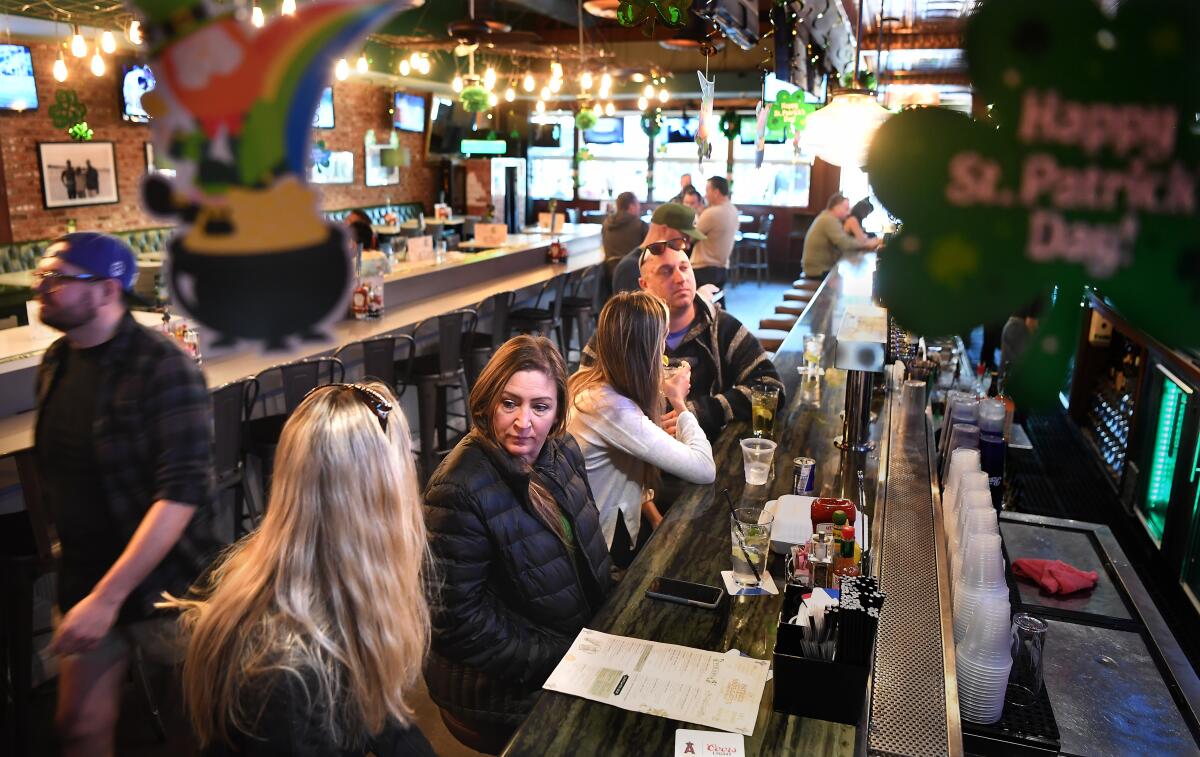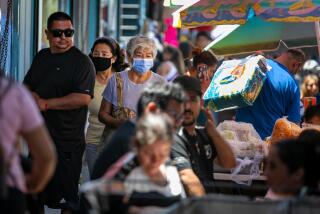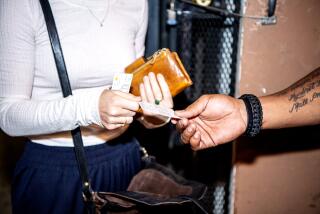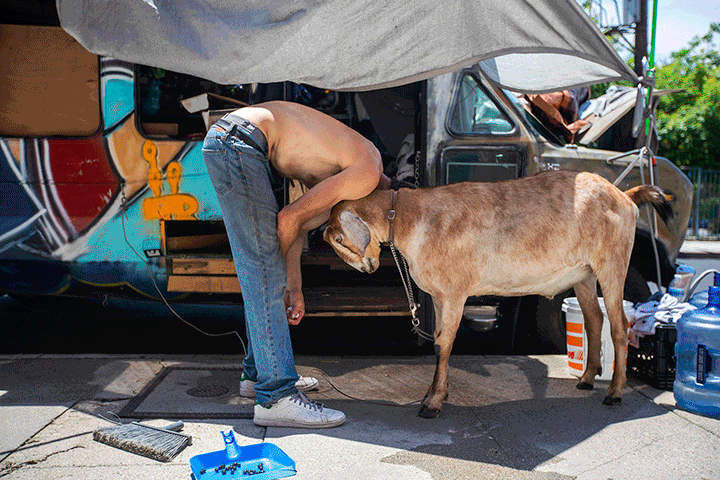Despite dire coronavirus warning, some refuse to give up their routines

- Share via
As schools closed and store shelves emptied of toilet paper, Joseph Sanchez realized that life as he knew it was grinding to a halt.
What was next? Perhaps even bars would close to stop the spread of the novel coronavirus that has killed more than 6,500 people worldwide?
Sanchez invited a friend, Marcos Avina, to meet at their favorite spot, Glendale Tap, for what he termed “one more moment of normality.”
His hunch proved prescient.
As he and Avina sipped craft beers Sunday afternoon at the neighborhood bar on San Fernando Road, Gov. Gavin Newsom announced that bars in California should close their doors, restaurants should seat customers farther apart and senior citizens should isolate themselves.
“This could be the last bar we go to in a long time,” said Avina, 40, a bill collector for Spectrum, the internet and cable company.
(Late Sunday, Mayor Eric Garcetti went even further, ordering bars in Los Angeles to close and restaurants to halt dine-in service until March 31.)
Newsom’s directive rippled across California on a day when some people hunkered down at home with stockpiles of supplies while others ventured out for brunch or a stroll at the mall.
For older Californians, the hard-won pleasures of their golden years — outings with grandchildren, breakfast at a diner with friends, dressing up for the opera — were being snatched from them. Some local seniors were angry and defiant, even as they knew they were especially vulnerable to the virus that causes the disease known as COVID-19, which can ravage the lungs and has a fatality rate that increases exponentially with age.
For bar and restaurant workers, it was about more than the deprivation of simple joys — it was a question of survival.
“I understand why,” Holly Halay, the bartender at Glendale Tap, said of the governor’s order. “We’re like walking petri dishes, who could be carrying the virus even though we have no symptoms. The scariest thing is, what to do about rent this month?”
Halay, 32, said the manager called and said the bar would be closed starting the next day. She lives paycheck to paycheck and will have to appeal to her landlord for extra time.
Sanchez, 30, is a custodian at a community college and will still be paid even if the campus shuts down. Avina‘s boss said he can cut back on in-person visits and do his work by phone.
They are not worried about surviving. But for the childhood friends, losing the bar where they meet at least once a month and having to watch old basketball games on television after the postponement of the NBA season — including ones featuring the late Kobe Bryant — is unnerving.
“We need a place to clear our heads. We don’t like to feel like we’re in a war zone,” Avina said.
In West Hollywood, the iconic gay bar the Abbey had closed because of the virus even before Newsom’s announcement.
As happy hour began on Sunday afternoon, bars such as Trunks, Micky’s and Fiesta Cantina were packed and blasting loud music.
Drag performer Serena Infinity, who was enjoying happy hour at Micky’s, said she was already having a hard time financially because many bars had canceled shows or closed altogether.
“It’s a little bit of an inconvenience, especially for people like me,” said the 22-year-old, who performs drag full time. “My primary income is open bars. It’s stopping my flow of money.”
Malcolm Pipkins, 29, would usually be at Revolver Video Bar, which offers $2 drinks on Sunday, or perhaps the Abbey.
Instead, he was at Micky’s, frustrated at the governor’s call for bar closures. But, he said, West Hollywood’s gay community would find a way to have fun.
“AIDS didn’t stop us in the ’80s. Corona isn’t going to stop us now,” he said.
Earlier in the day, before the governor’s announcement, popular brunch and shopping spots were less crowded than usual but still drew plenty of die-hards.
At Millie’s Cafe on Sunset Boulevard in Silver Lake, customers packed the outside seats, but there were some empty tables — unheard of on a Sunday morning when the wait is usually half an hour.
Owner Robert Babish rushed among the tables with a yellow towel on each arm, giving surfaces an extra wipe-down. He has brought in two extra workers to do more cleaning and sanitizing.
“I’ll try to be open as much as I can,” said Babish, who has owned the cafe for 20 years. “People still want to eat.”
Ken Coon and his husband, Michael L. Miller, eat at Millie’s almost every day. But this would be the last time for a while. The virus is “just blowing up too much,” said Coon, of Atwater Village.
The two had stocked up on food and eliminated their weekly movie outings while continuing to eat out. They trust Babish to keep Millie’s as clean as possible. But there is still a risk, especially because Coon is 56 and Miller is 67.
They were planning a luxurious dinner at home that night — a seven-bone roast with onions, potatoes and carrots.
At the Americana at Brand outdoor mall in Glendale, the Apple Store, which usually draws large crowds, was closed. Most other stores were open, and families strolled with children and dogs, stopping for pretzels or ice cream.
“Our lives should still go on. We shouldn’t let the virus make us stay home,” said Maly Lee, 52, who works in merchandising. “We shouldn’t just sit home and be depressed. The more you think about it, the more depressed you get.”
Still, Lee, who was at the mall with her Labrador retriever mix, her husband and two aunts in their 60s, was taking precautions. A mini bottle of hand sanitizer dangled from her purse, and she washed her hands every 20 minutes when eating at the Cheesecake Factory.
Shortly after Newsom’s recommendation that people 65 and older isolate themselves, 67-year-old Tamara Sevoian arrived at Pacific Park in Glendale with her daughter and grandson.
She is a licensed vocational nurse at a Veterans Affairs hospital and plans to keep working until she is 74. She is washing her hands often and keeping her house sparkling clean. She has no intention of staying home.
“I have to work. I have to go out and play with my grandson,” she said. “I’m not old. I’m doing a lot.”
Linda Pierce, 76, of Playa del Rey, was a computer systems engineer for many years, then reinvented herself as a landscape architect.
In retirement, she makes the rounds of opera houses around the country. Nearly all the performances are canceled, including Wagner’s “Ring” cycle in Chicago next month.
Exercise is on hold, too. Her trainer is self-quarantining after possibly being exposed to the coronavirus through another client.
With the governor’s order to close bars, the happy hour at her local wine bar may also be a thing of the past.
Pierce knows she is in a high-risk group for the virus. Her partner, who is 79 and smokes, is even more vulnerable.
They have no close relatives nearby, so she will continue to shop at the supermarket. She thinks it is still safe to meet with small groups of friends, perhaps for picnics in the park.
“Normally, I’m a really active person,” she said. “Now, everything, it seems, has been taken away from me.”
More to Read
Sign up for Essential California
The most important California stories and recommendations in your inbox every morning.
You may occasionally receive promotional content from the Los Angeles Times.















